November Books - 15

One of the finest books about World War I is Paul Fussell's The Great War and Modern Memory (1975.) Fussell describes his book perfectly in the first sentence of his preface:
This book is about the British experience on the Western Front from 1914 to 1918 and some of the literary means by which it has been remembered, conventionalized, and mythologized. . . . if the book had a subtitle, it would be something like 'An Inquiry into the Curious Literariness of Real Life.'
I have focused on places and situations where literary tradition and real life notably transect, and in doing so I have tried to understand something of the simultaneous and reciprocal process by which life feeds materials to literature returns the favor by conferring forms upon life.
. . . At the same time the war was relying on inherited myth, it was generating new myth, and that myth is part of the fiber of our own lives.
Fussell describes the course of the war and some of the battles, and he quotes extensively from the literature that was written during and after the war. Much of that literature, especially poetry, was very different from what had gone before.
Some of the conclusions about the effect of WW I on our world that Fussell reaches are significant:
. . . at the beginning of 1916, with the passing of the Military Service Act, England began to train her first conscript army, an event which could be said to mark the beginning of the modern world.
. . . one powerful legacy of [General Sir Douglas] Haig's performance is the conviction among the imaginative and intelligent today of the unredeemable defectiveness of all civil and military leaders.
I am saying that there seems to be one dominating form of modern understanding; that it is essentially ironic; and that it originates largely in the application of mind and memory to the events of the Great War.
For those of us who read "literary fiction" as well as those who read history, sociology, political science, current affairs - for all of us - this book is a revelation. It's one of the best books I've read in the last 20 years.


0 Comments:
Post a Comment
Subscribe to Post Comments [Atom]
<< Home